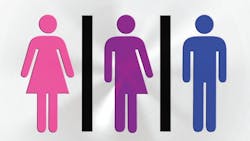Minnesota Court of Appeals rules in favor of transgender student in locker-room access case
The Minnesota Court of Appeals has ruled that schools public schools in the state must allow students to use locker rooms that align with their gender identity under the state’s civil rights law.
The Minnesota Department of Human Rights says in a news release that the ruling comes in a lawsuit against the Anoka-Hennepin School District, the largest public school system in the state. The department had accused the district of unlawfully forcing a transgender student to use a segregated locker room based solely on his gender identity.
“This decision means that schools are now safer and more welcoming for transgender and gender nonconforming students across Minnesota,” says Minnesota Department of Human Rights Deputy Commissioner Irina Vaynerman. “Our state was the first in the nation to prohibit gender identity discrimination. Today’s decision honors that legacy and continues to build a more equitable and inclusive Minnesota.”
[MORE: Read the Court of Appeals opinion]
The court held that it is unlawful to require transgender students to use a locker room that is inconsistent with their gender identity. The ruling recognized that "students should not be required to 'shop' among schools and districts to obtain a discrimination-free education."
The transgender student, identified only as N.H., used the boys’ locker room without issue after he joined the boys’ swim team at Coon Rapids High School during the 2015-16 school year. The following year, the district required him to use a separate and segregated locker room and threatened to discipline N.H. if he did not use the separate room.
By segregating N.H. to a separate changing space, the Anoka-Hennepin School District violated the Minnesota Human Rights Act, which prohibits gender identity discrimination in schools.
The ruling by the Minnesota Court of Appeals comes on the heels of the U.S. Supreme Court decision earlier this year in Bostock v. Clayton County, Georgia and additional federal court cases this summer that affirmed that discrimination based on sexual orientation and gender identity is illegal under federal law.
About the Author
Mike Kennedy
Senior Editor
Mike Kennedy, senior editor, has written for AS&U on a wide range of educational issues since 1999.
